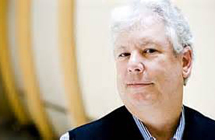不会演戏的经济学家不是好股神,这位新晋诺奖得主有点意思
|
Peter Gardenfors, member of the committee for the Economics Prize said, Thaler's achievements successfully integrated economics and psychology, as he made economics "more human." And his theories "help people make better economic decisions."
塞勒1945年出生在美国,是行为经济学之父,现执教于芝加哥大学商学院,同时在国民经济研究局主管行为经济学的研究工作。 塞勒还是一家基金公司的创始人,专注美国小企业股。在他的行为经济学理论下,公司替摩根大通管理的一只基金表现优异,2015年基金规模激增1倍至37亿美元,目前资产总规模已达60亿美元。 不会演戏的经济学家不是好股神,如果你看过获得2016年奥斯卡最佳改编剧本奖的电影《大空头》,一定会觉得这位新晋诺贝尔奖得主有些眼熟。 Thaler's work earned him a glamorous foray into the movie business when he made a cameo appearance, alongside Christian Bale, Steve Carell and Ryan Gosling, in the 2015 movie 'The Big Short' about the credit and housing bubble collapse that led to the 2008 global financial crisis.
用塞勒徒弟、中欧国际工商学院金融学副教授余方的话来评价塞勒的学术风格,那就是有点“非主流”,“总跟别人做的研究不太一样”。
Thaler has incorporated psychologically realistic assumptions into analyses of economic decision-making. By exploring the consequences of limited rationality, social preferences, and lack of self-control, he has shown how these human traits systematically affect individual decisions as well as market outcomes. 听起来太高大上?下面我们将用尽量通俗的语言来介绍塞勒的主要理论: Limited rationality Thaler developed the theory of mental accounting, explaining how people simplify financial decision-making by creating separate accounts in their minds, focusing on the narrow impact of each individual decision rather than its overall effect. 举例说明: We may have a “vacation” budget in our heads, and a “household maintenance” budget, and we tend not to mix them. If we get an unusually good deal on our airfare to Hawaii, we won’t use the savings to have the carpets cleaned; we’ll spend more at the bar on our vacation, keeping the money in the appropriate bucket.
其实“禀赋效应”在生活中有很多体现,比如下面这个经典的掷硬币打赌的例子: In the first case, you are offered the chance to bet on the toss of a coin: You can win $10 if you call the coin toss correctly, or lose $10 if you call the toss incorrectly. Most people will decline the bet.
Social preferences Thaler’s theoretical and experimental research on fairness has been influential. He showed how consumers’ fairness concerns may stop firms from raising prices in periods of high demand, but not in times of rising costs. 还是用一个通俗易懂的例子来说明: Let’s say you run a building supply company located in a hurricane warning area, and everyone is coming in to buy plywood. It would be bad practice to raise prices with a sign that says: “We have raised our prices so that plywood is only bought by those who really need it.” Good practice would be to raise prices with a sign that says “Our wholesale cost of plywood has increased, and we have to pass the cost along to you. But we have not raised our profit margin.” Thaler and his colleagues devised the dictator game, an experimental tool that has been used in numerous studies to measure attitudes to fairness in different groups of people around the world. Lack of self-control Thaler has also shed new light on the old observation that New Year’s resolutions can be hard to keep. He showed how to analyze self-control problems using a planner-doer model, which is similar to the frameworks psychologists and neuroscientists now use to describe the internal tension between long-term planning and short-term doing. Succumbing to short-term temptation is an important reason why our plans to save for old age, or make healthier lifestyle choices, often fail. In his applied work, Thaler demonstrated how nudging – a term he coined – may help people exercise better self-control when saving for a pension, as well in other contexts. “助推理论”的原理: 缺少思考时间、习惯以及失败的决策意味着即使事实分析摆在眼前,比如明知健康饮食的好处,我们仍然可能选择汉堡和薯条。 We're hungry, we're in a hurry and burger and chips is what we always buy. Nudge theory takes account of this, based as it is on the simple premise that people will often choose what is easiest over what is wisest. Tests have shown that putting healthier foods on a higher shelf increases sales. The food is more likely to be in someone's eye line and therefore "nudge" that person towards the purchase - whether they had any idea about the obesity argument or not. |









